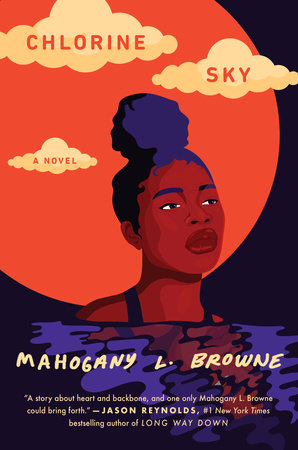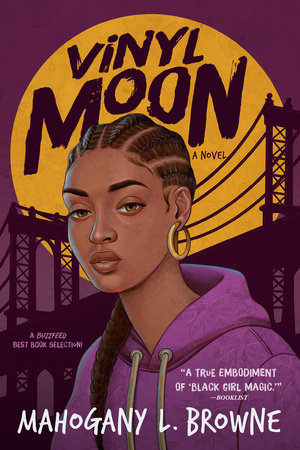We talked with Mahogany L. Browne, first-ever poet-in-residence at Lincoln Center and author, about her writing process and advice, and how she would describe Vinyl Moon. Be sure to connect with Mahogany at @mobrowne. Scroll for our Mahogany L. Browne interview for writing inspiration, a look at Chlorine Sky, Vinyl Moon, and more.
What does your writing process look like?
My writing process looks like morning meditation. I begin with an affirmation card in my writing journal or by responding to open-ended questions. (The New York Times has a great list!) When I’m on deadline, I use a writing method my dear friend Cristin introduced me to. I write for forty-five minutes, then I have a fifteen-minute break. No matter what. I do four to six rotations of this a day and have found it keeps me excited to return to the page, rather than full of dread.
Begin telling the story that hasn’t been told yet.
Do you ever get writer’s block? How do you combat it?
I write things that I don’t like all the time. I’m bored and uninspired and plain ol’ mad at the page. But I feel like those are just moments to allow the story to incubate a bit longer. I read and I research and I binge Star Trek: Discovery and I find a way back to the page.
Was your writing process the same for Vinyl Moon and Chlorine Sky?
With Vinyl Moon, I wrote every day for a month and then edited every day for several months. I wrote Chlorine Sky from memories and snapshots. A lot of it was fictionalized, but the fiction intermingled with real memories. Vinyl Moon allowed me to work from a different space. I had memories of teaching in public schools, but I dreamt the entire thing. And because of that, I felt like I could stretch my imagination even further. The edits were also easier because I was writing with a hybrid form in mind, so when I felt like there was stagnancy, I could try to resolve that with a poem, a text message, or an epistle.
Do you have any advice for folks who want to try writing in verse?
Read as many novels-in-verse as possible. Read books of poetry and share your favorite lines with a friend. Note what excites you about the form. Begin telling the story that hasn’t been told yet. Print it all out. Read it out loud, as if you were performing it, and make sure there are no holes in the story. When writing novels-in-verse, I found that was the biggest issue. I was used to writing a poem that could resonate on stage, but writing a story in verse is a different ball game altogether.
Describe Vinyl Moon in one word.
Redemptive.



